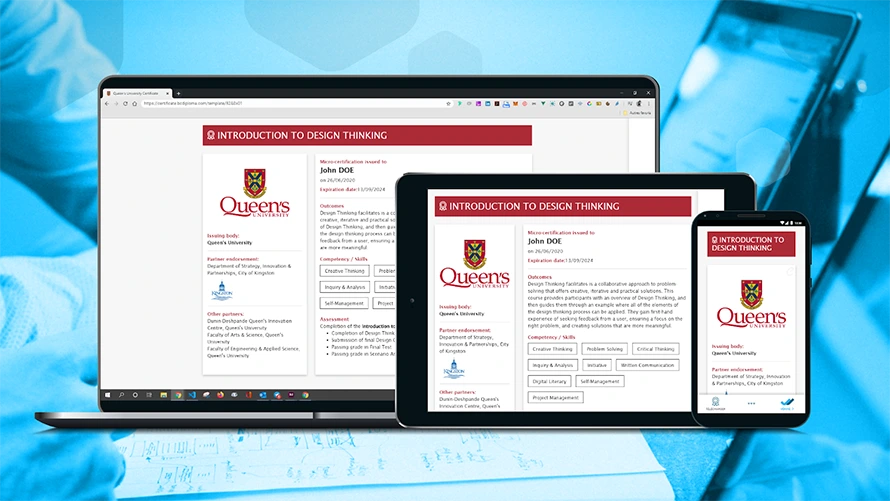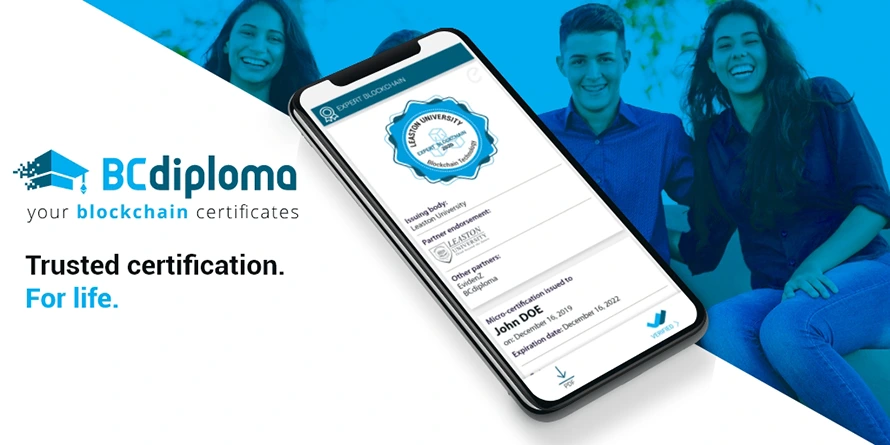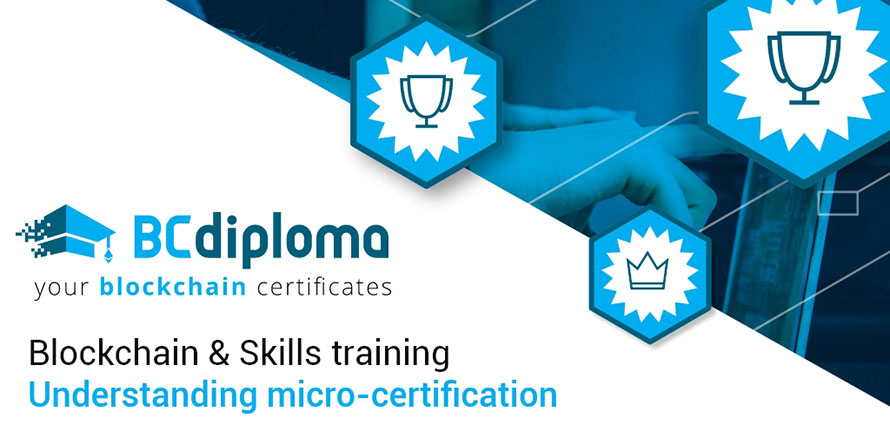What is a micro-credential?
A micro-credential is an official certificate of recognition granted to a learner who has acquired a competency, according to a very precise breakdown of skills. Micro-credentials are smaller, shorter programs of study (consisting of a few designated courses) designed to build in-demand career skills and deepen the learner’s understanding of a subject, with the opportunity to earn a professional or academic credential, without the time and cost commitment of a full university degree for instance. Such courses are a great way to supplement a college education and learn new skills throughout one’s career.
“Many agree that the concept has emerged in response to the skills gap caused by new technologies. Essentially, micro-credentials are bite-sized chunks of education, whether an online course, bootcamp certificate or apprenticeship from a traditional university, specialty provider or online learning platform like Coursera, EdX or Udacity.” BBC, Could micro-credentials compete with traditional degrees?
In Canada, eCampusOntario, a government-funded not-for-profit organization, is currently working with universities and colleges to develop micro-certifications in collaboration with industry partners. “A flexible and reliable recognition system is essential for professionals and employers, who are increasingly moving towards competency-based or skills-based recruitment. Micro-certificates differ from traditional credentials, such as degrees and diplomas, yet provide distinctive value and relevance in the business world”.

What are the benefits of micro-credentials for employers?
Micro-credentials offer numerous benefits for employers and organizations of all sizes, and are very cost-effective to implement in the form of scalable training programs. They can help to boost employee engagement in their work and help track their development.
Rather than investing in a broad, uniform learning program for entire departments or teams, employers can develop a training and assessment process closely aligned to their current work practices, and tailor groups of micro-credentials to individual staff members to suit their own career goals and responsibilities. They can thus earn unique stacks of micro-credential that closely meet their training or learning requirements and supplement their education and university degree.
What are the benefits of micro-credentials for employees?
Micro-credentials offer employees the opportunity to focus on one single skill or area of their trade, through specific training courses or learning programs.
Micro-credentials are ideally suited to recognize employees’ soft skills as well as the knowledge they’ve gained on the job or through continuous training. While traditional qualifications tend to focus on hard skills, soft skills like leadership, problem solving and communication are equally vital in the workplace.
Former students and career professionals have an overall positive view on micro-credentials:
- 35% of employees said that earning micro-certifications helped them get a job or move forward in their career
- 70% think their company would or could benefit from partnering with a micro-certification provider
- 85% would seek or would be very likely to seek micro-certification if their employers facilitated the offer
- More than 90% of employees say they plan to pursue other micro-certifications in the future
- More than 90% of them would also recommend micro-certifications to their peers and colleagues
What are the categories of micro-credentials?
Digital Open Badges are the best known, but we must not forget the various digital badges, online certificates and professional micro-certifications. Let’s take a look at these different terms to understand them!
Once a micro credential is obtained, the learner is provided with a proof of success: it often appears as a certificate accessible online, commonly called a digital badge. The open source digital Open Badges format is the most popular today because it can be implemented by any institution and offers interoperability and durability ensured by a growing ecosystem of more than 3,000 organizations around the world that create and issue this type of digital micro-certification today.
These badges will follow the learner, the employee, throughout his/her career. As These badges will follow the learner, the employee, throughout their career. As such, they must be “verifiable”, i.e. easily recognized as authentic, with an easy-to-trace origin.

How are micro-credentials earned?
Earning a micro-credential can take anywhere from a few weeks to a year. The training course and assessment needed to earn a credential may vary depending on the qualification, but it typically includes a combination of:
- Assignments: Employees might be asked to complete tests, assignments and projects to demonstrate their knowledge, learning or skills.
- Lectures and seminars: Employees attend such events to learn about the latest ideas or research in a field.
- Portfolio – Employees might show their team their portfolio of work in a specific field to their team.
- Assessment: tests or practical exercises could be part of the micro-credential earning process.
- Conferences: Employees could have the opportunity to attend conferences focused on a specific topic or field.
- Demonstrate skills in work setting: Employees could be asked to demonstrate they can successfully apply their skills in the area in the workplace.
Traceability, authenticity, durability: why is blockchain becoming the definite standard for micro-credentials?
The Blockchain is fast becoming a lever for a skill-oriented educational approach: it enables the delivery of secure Open Badges and micro-credentials for professional use.
As with diplomas, the question of the authenticity of skill badges or micro-certifications is key, and the blockchain in education, a decentralized, durable and tamper-proof database, ensures an unequalled level of security.
BCdiploma is the first player to offer 100% blockchain technology for online certificates (called Digital Credentials) and secure Open Badges for professional use. Ontario universities, IFOCOP and emlyon executive education use this latest-generation format.
“The blockchain-based technology [note: BCdiploma] that eCampusOntario is using to issue these micro-certifications ensures that all data and records are encrypted and immutable, while protecting the right to be forgotten upheld in the GDPR.” states eCampusOntario in its article “Micro-certification: towards recursive system learning”.
How is France putting the spotlight on micro-credentials?
A “skill block” is a “homogeneous and coherent set of skills which contribute to the autonomous exercise of a professional activity and which can be assessed and validated”, in other words, “part of a diploma or professional training” (Uniformation).
The act of September 5, 2019 “For the freedom to choose one’s future career” states that the professional certifications registered in the RNCP must be divided into skill blocks…in other words, into micro-certifications.
FAQ
What are micro-credentials?
A micro-credential is an official certificate of recognition granted to a learner who has acquired a specific skill or competency through a course or training program. They are most typically used in a professional setting to supplement an education or university degree. Some micro-credentials, such as coding bootcamps or app development, could even fill gaps that traditional university or college courses can’t.
What are the benefits of micro-credentials?
A university or college degree is no longer enough, and a lot of students and career professionals now need to continuously acquire new skills and focus on personal development, and choose to commit to lifelong professional learning. Indeed, degree-holders see micro-credentials as a relevant way to supplement their education and core qualification. Anything they do to earn valuable skills will make them a valuable candidate on the job market.
Do employers care about micro-credentials?
Such credentials tend to make candidates more marketable in the business world. Indeed, employers love proactive personalities and studies have shown that most hiring managers and recruiters view micro-credentials favorably on an applicant’s resume.
What are good examples of micro-credentials?
Micro-credentials can be earned for learning new skills in a short amount of time in the framework of training programs on creative problem solving, strategic decision making, or app development courses for instance. Others can be collected by becoming an educator and teaching others about leadership or marketing for instance.
[title[Maximizing Career Potential: The Power of Micro-Credentials]] [description[Understand everything about micro-certification, micro-credentials and Open Badges, these new tools that are revolutionizing learning paths]]